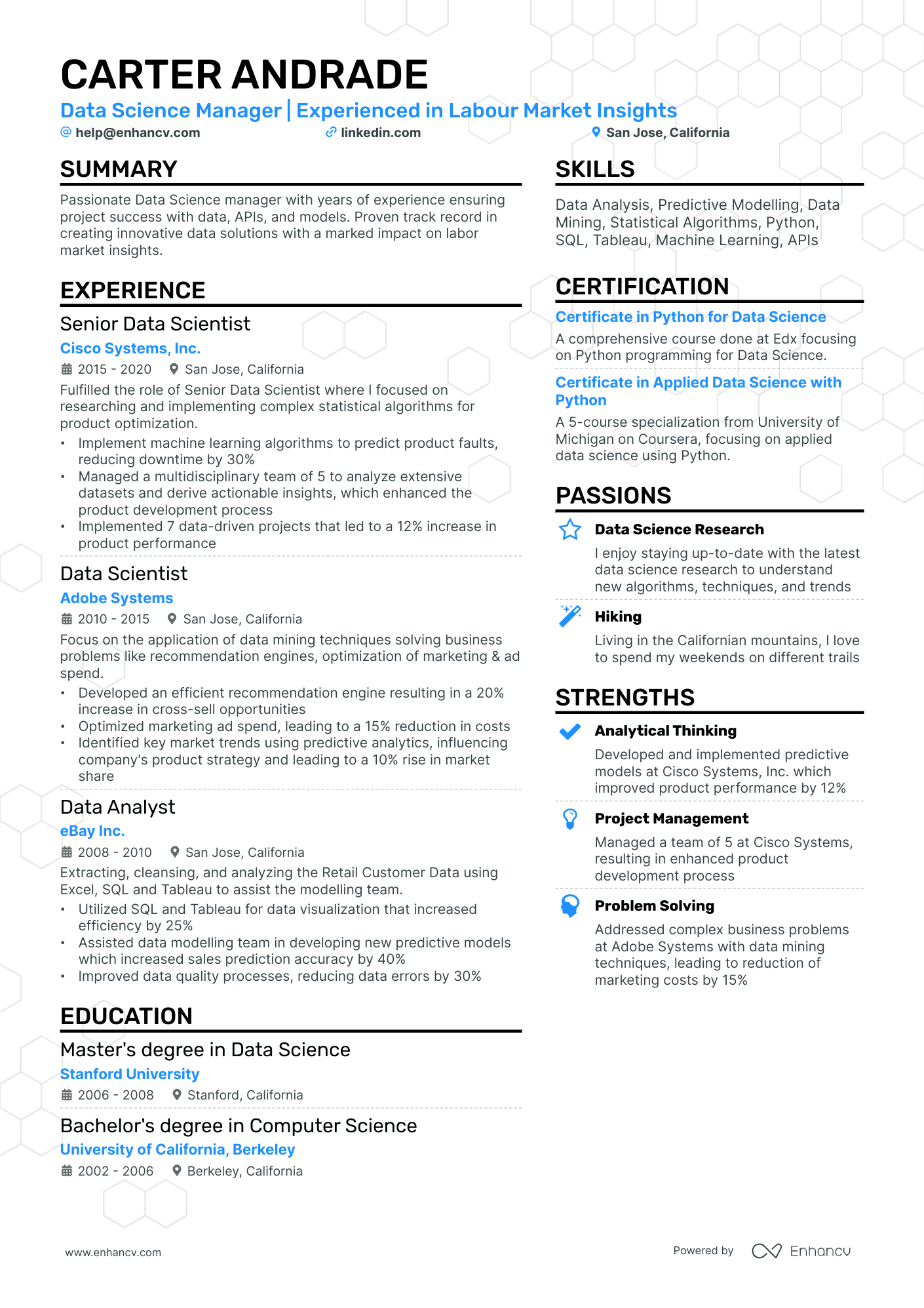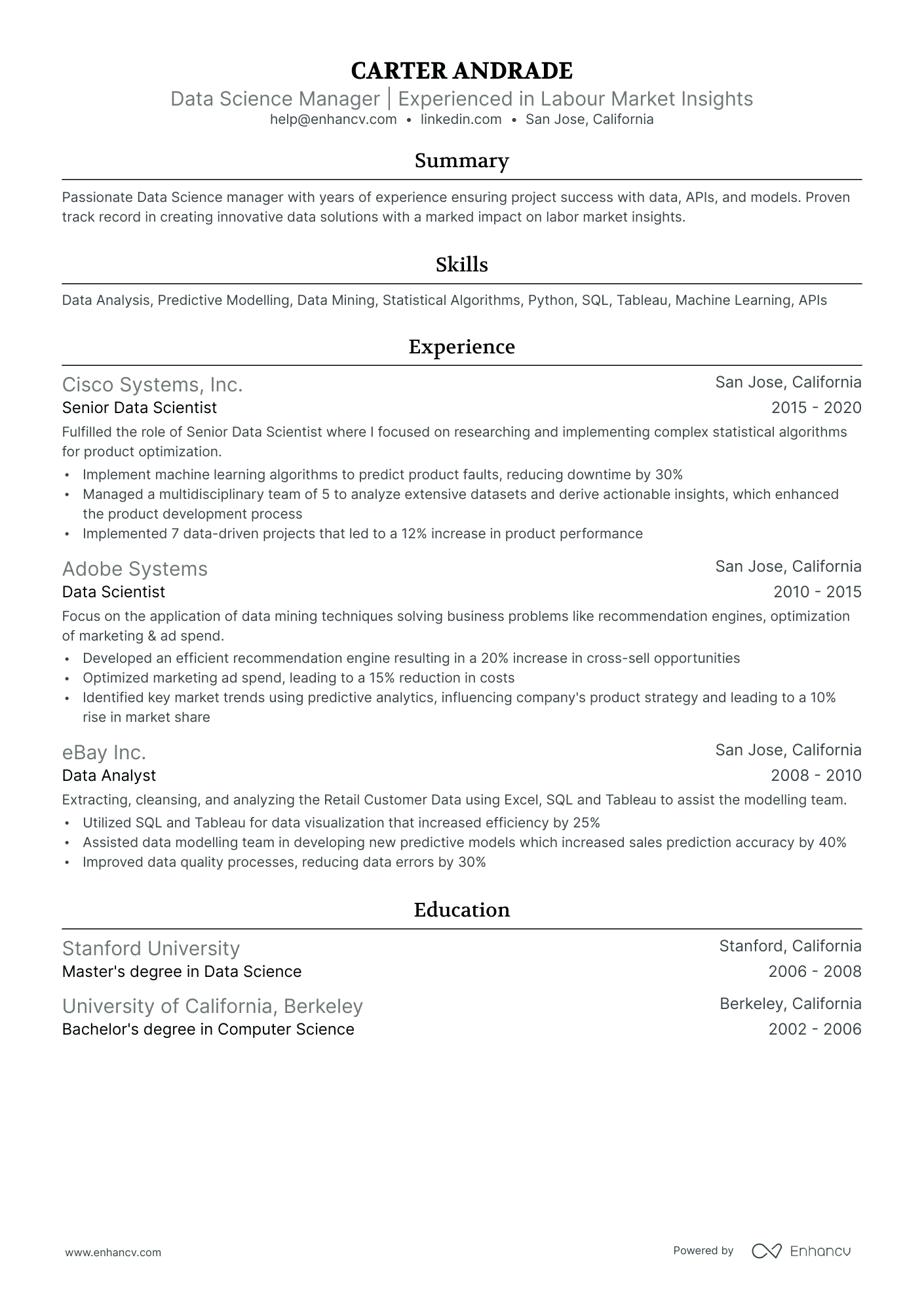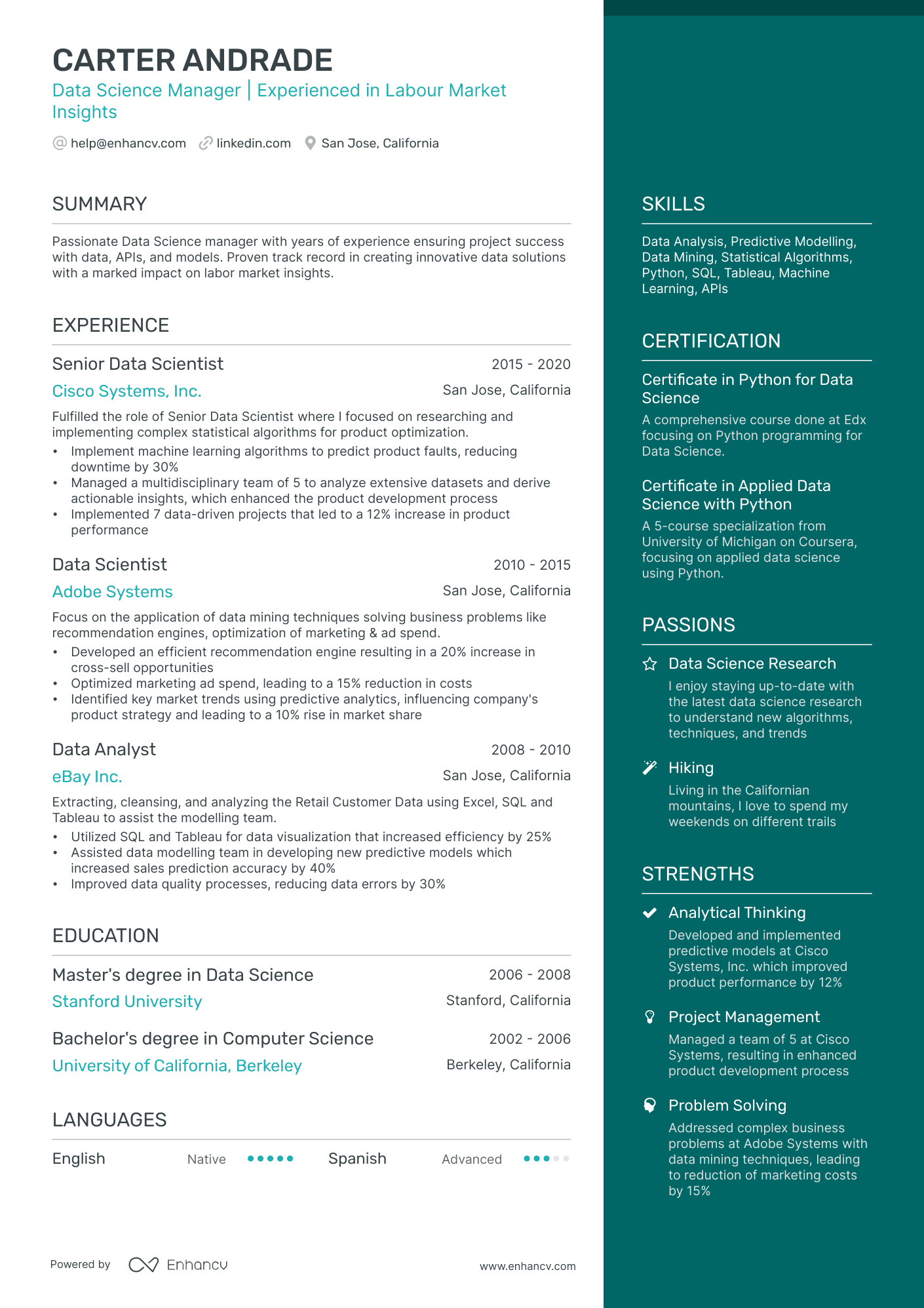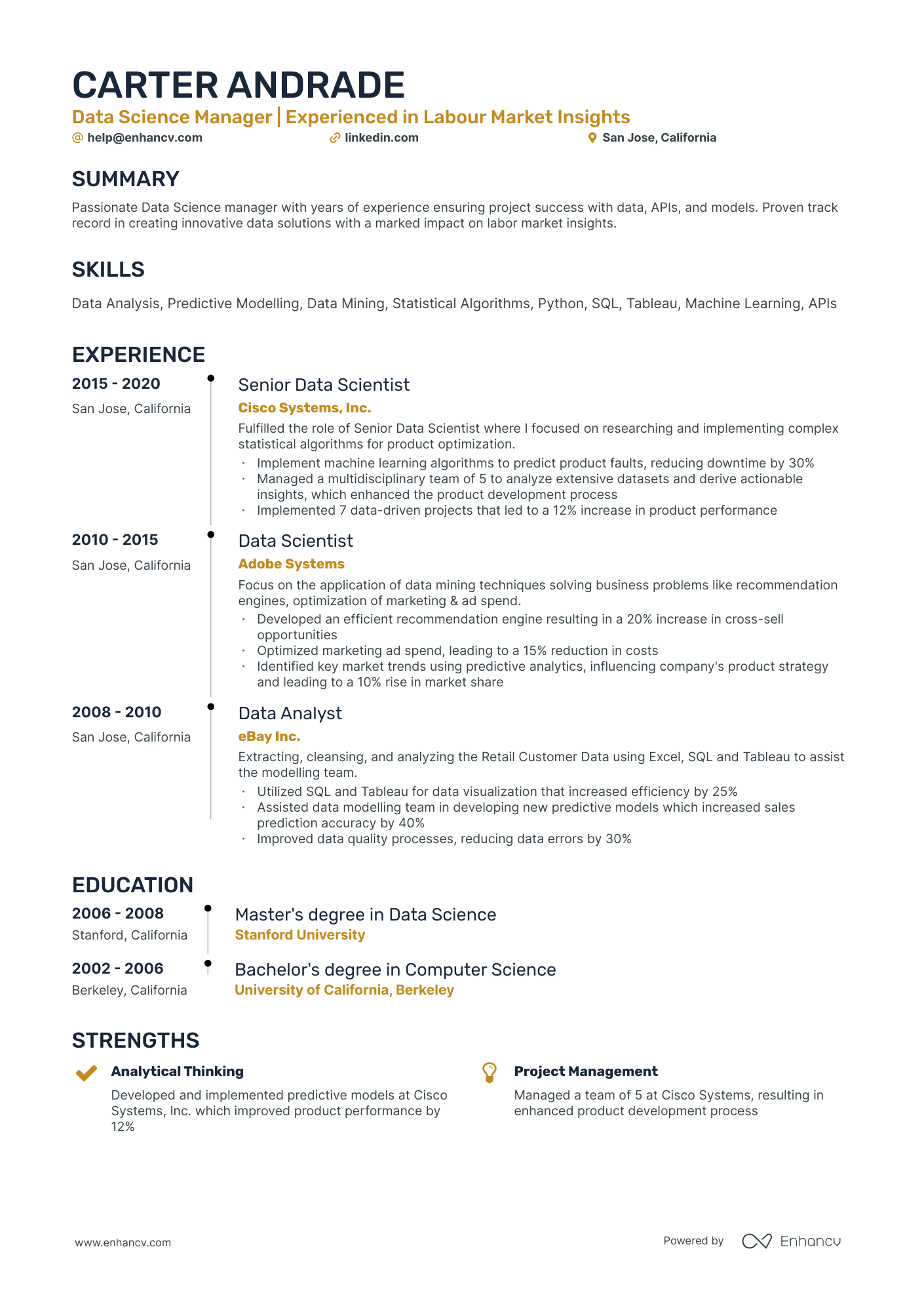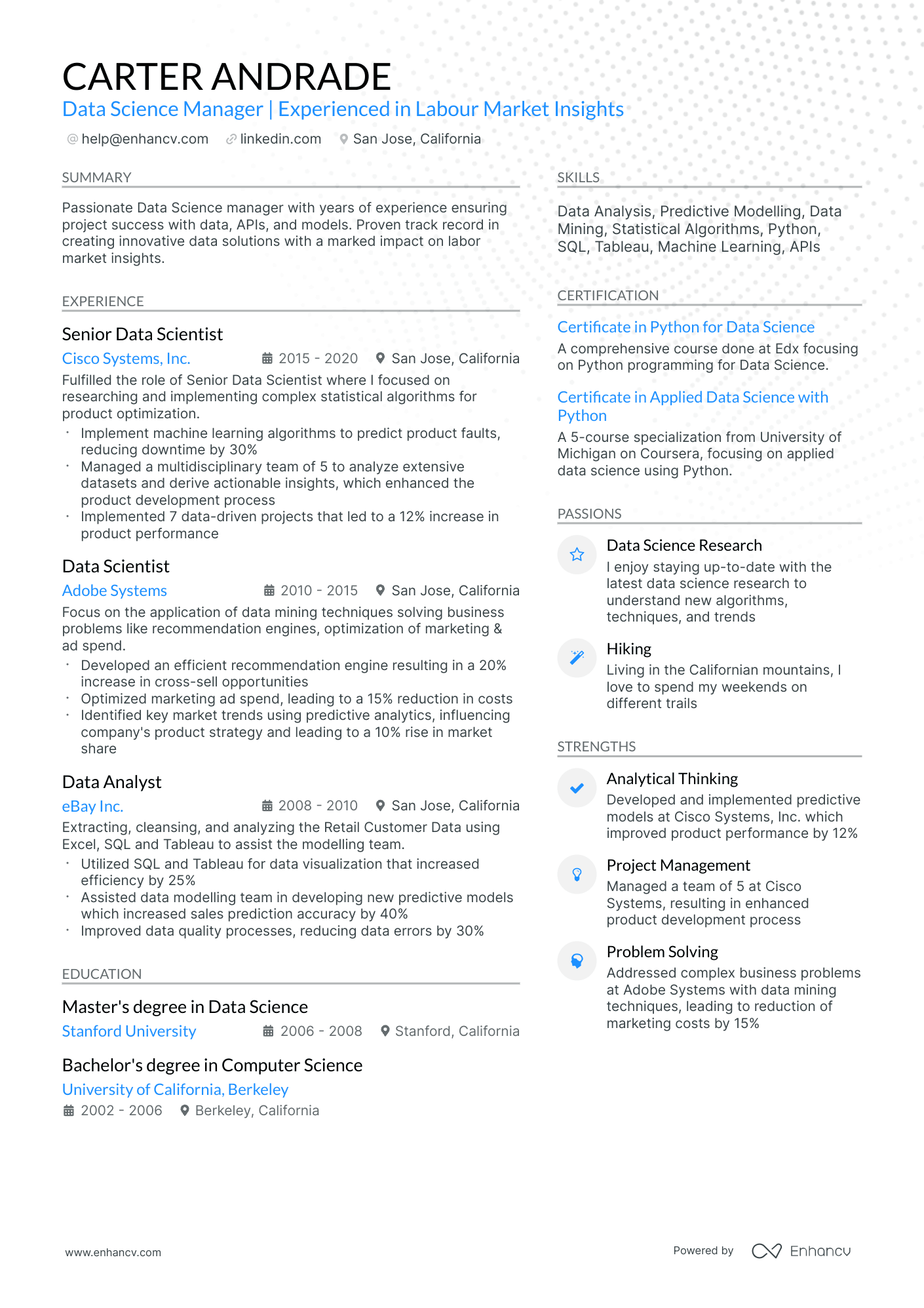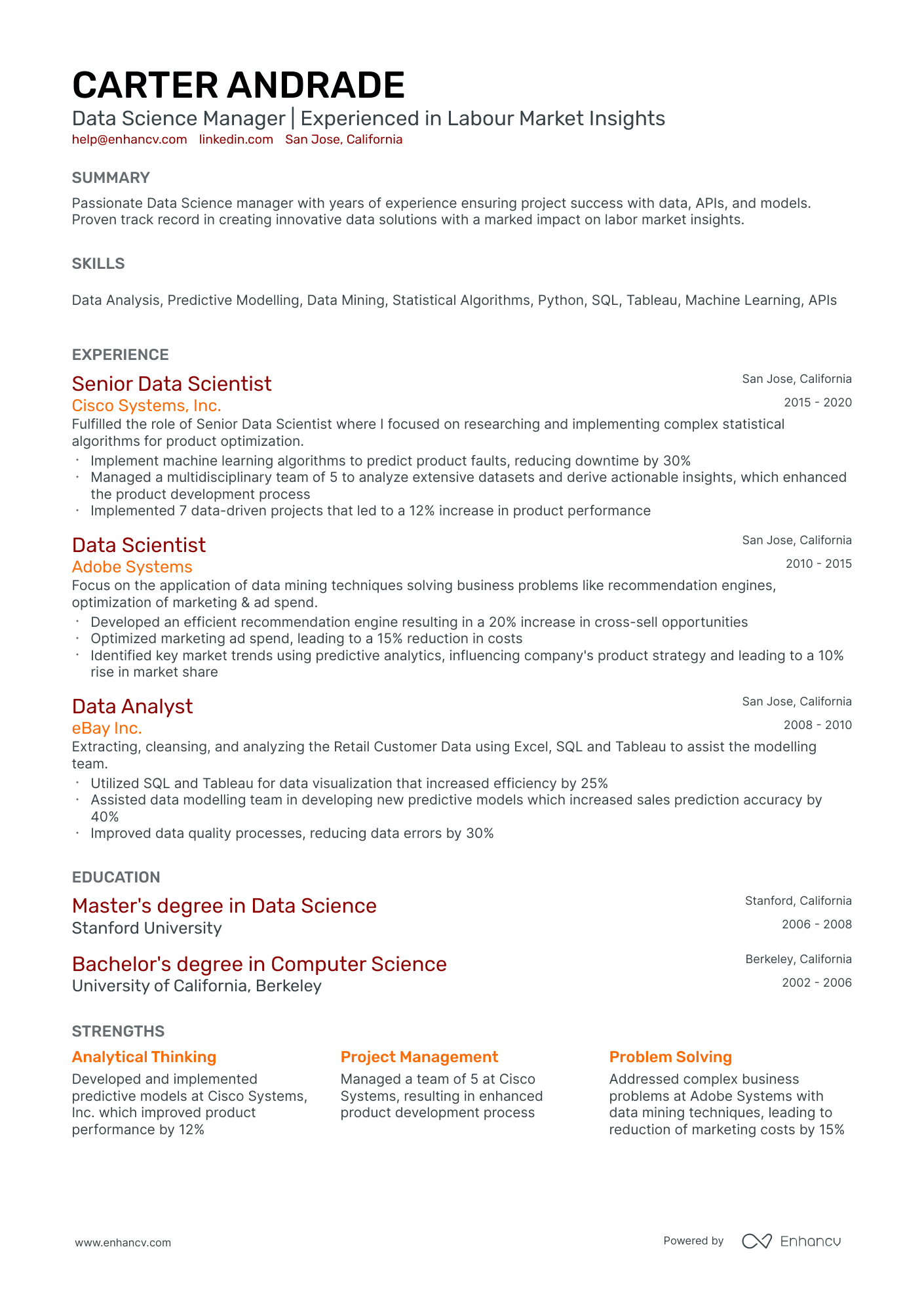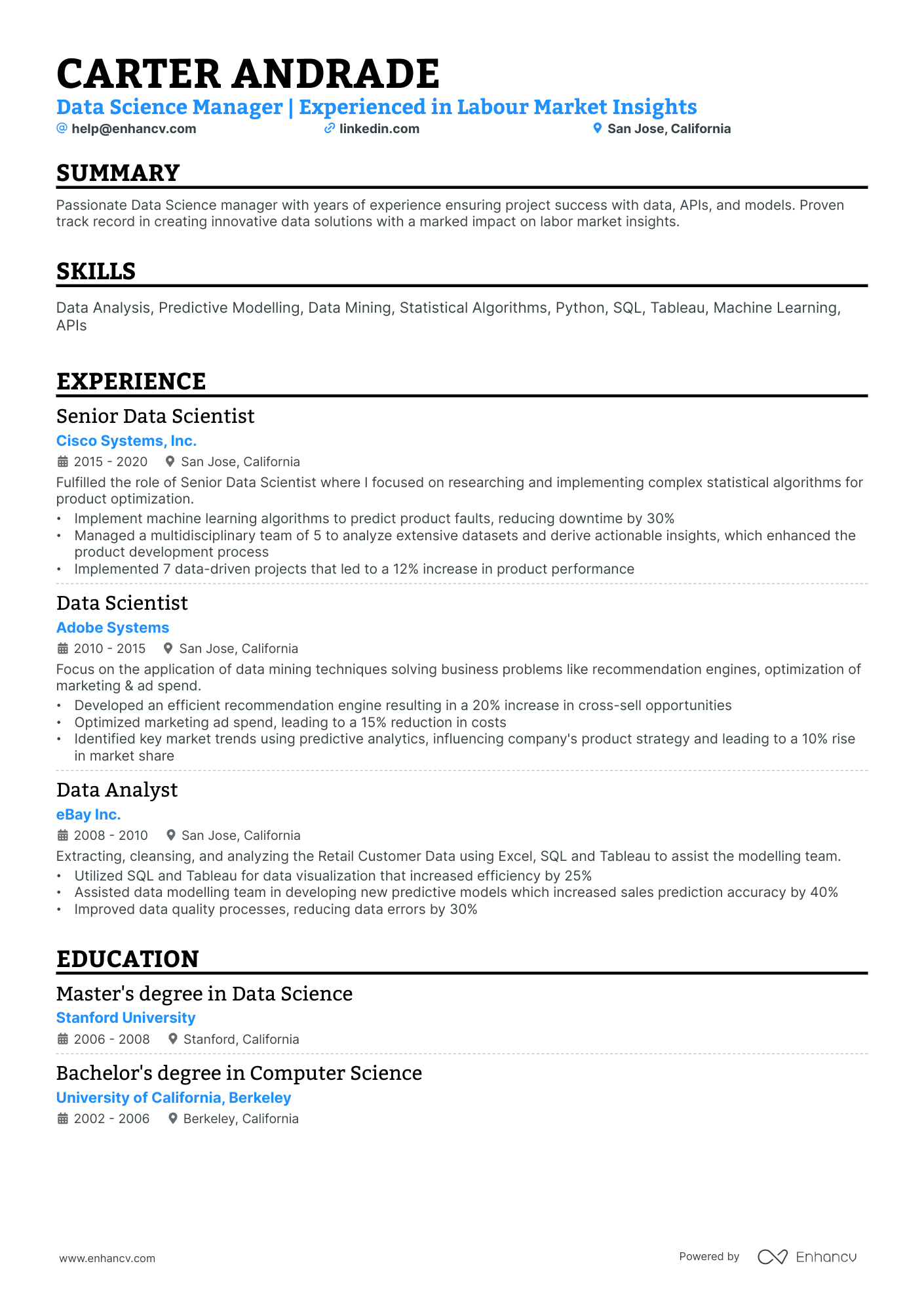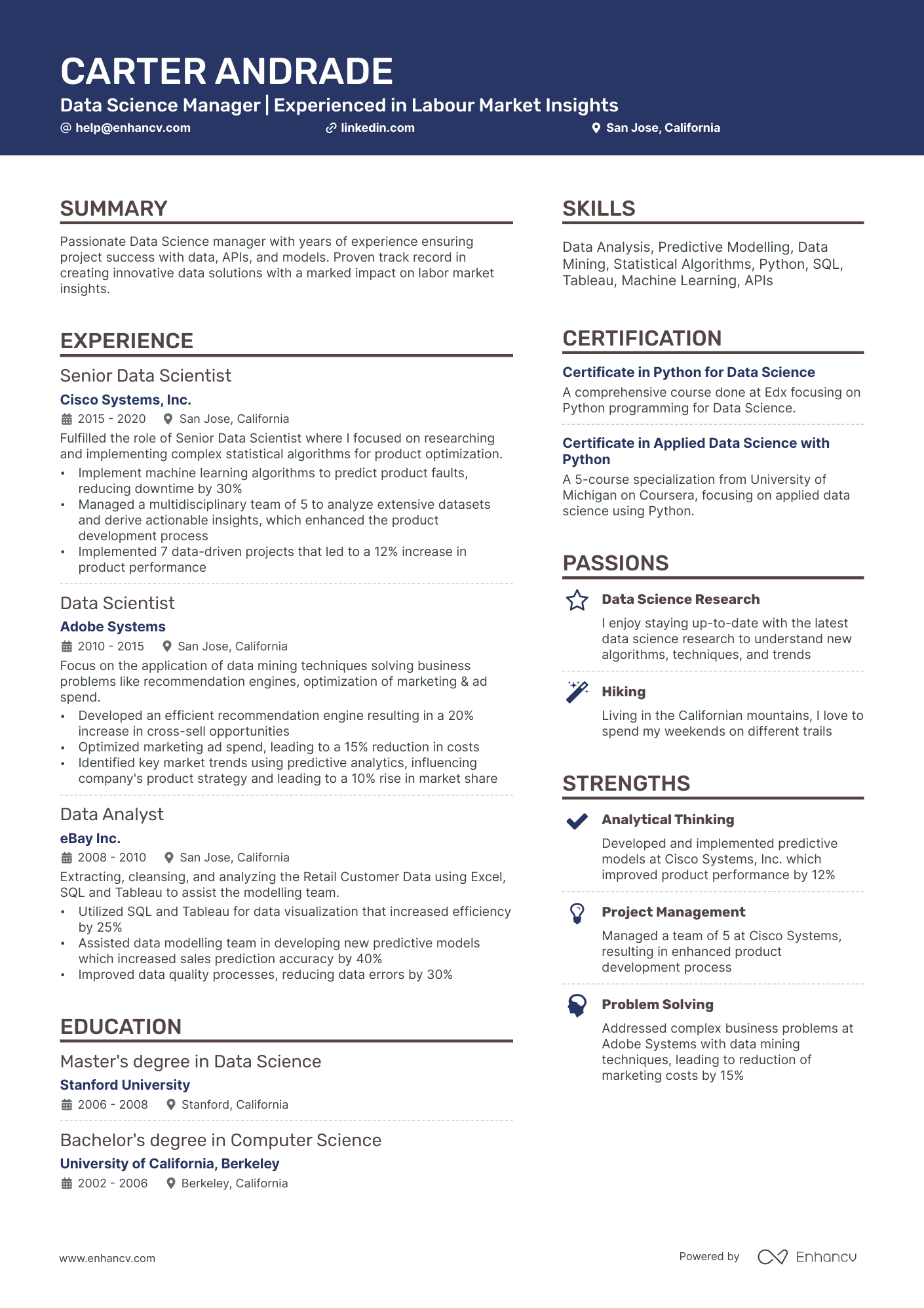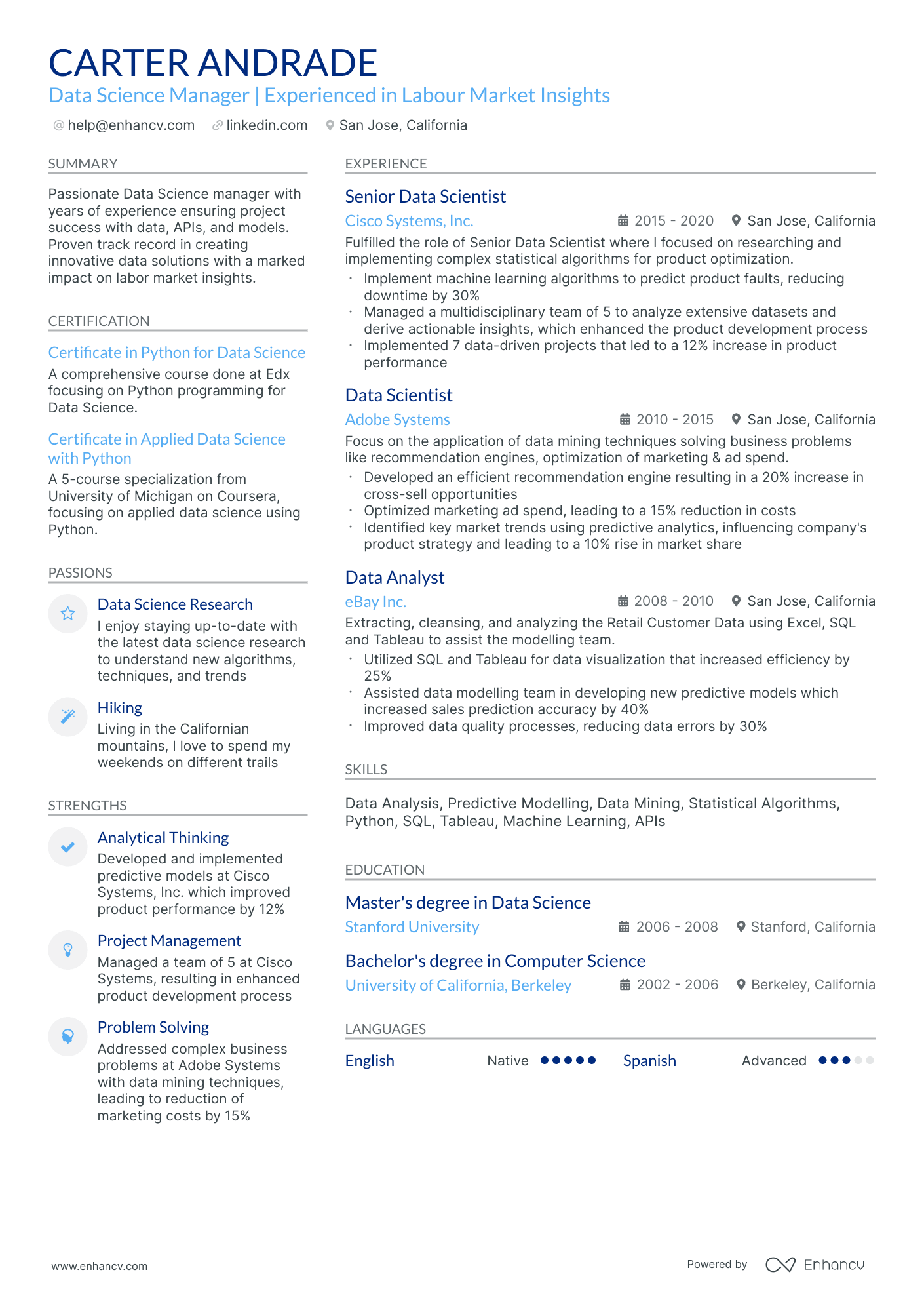One significant resume challenge faced by a data science manager is effectively demonstrating both technical expertise and leadership skills within the confines of a brief, concise document. Our guide assists in addressing this challenge by providing strategic tips on how to balance showcasing advanced data science competencies with evidence of strong managerial experience, using powerful, action-oriented language and real-world examples.
Enhance your application for the data science manager role with our concise guide on how to:
- Format your data science manager resume, ensuring a balance between professionalism and creativity, in line with best practices.
- Align your resume with the data science manager job requirements by incorporating relevant industry keywords.
- Utilize distinct resume sections to highlight your skills and achievements, making a case for why you're the top pick for the data science manager role.
- Draw from leading data science manager resume examples to effectively tailor your experience.
Recommended reads:
Tips for refining your data science manager resume format
The resume format sets the stage for your professional narrative. Ensure it:
- Adopts the reverse-chronological format, placing your most recent experiences at the forefront. This format is ideal for those with relevant and up-to-date experience.
- Features a clear headline, making it straightforward for recruiters to access your contact details, portfolio, or current role.
- Stays concise, ideally spanning no more than two pages, focusing on relevant experiences and skills.
- Maintains its layout by being saved as a PDF, ensuring compatibility with Applicant Tracking Systems (ATS).
Consider your target market – resumes in Canada, for example, follow different layout conventions.
Upload your resume
Drop your resume here or choose a file. PDF & DOCX only. Max 2MB file size.
Pro tip
Choose a legible, professional font for your data science manager resume, such as Arial or Calibri.
Elevate your data science manager resume with these essential sections:
- Header: The go-to section for recruiters seeking your contact details, portfolio, or current role.
- Summary or objective: A snapshot of your achievements and aspirations.
- Experience: A testament to your technical and interpersonal prowess.
- Skills: A showcase of your capabilities aligned with the job requirements.
- Certifications/Education: A reflection of your commitment to staying updated in the industry.
What recruiters want to see on your resume:
- Experience in Data Management: This includes expertise in data cleaning, data transformation, and the use of databases and data warehousing technologies.
- Proficiency in Data Analysis Tools and Programming Languages: The candidate should demonstrate proficiency in tools like Python, R, SQL, SAS, and business intelligence software alongside knowledge of machine learning algorithms and statistical modeling.
- Leadership Skills: As a Manager, the candidate must have experience leading teams, project management skills, and the ability to mentor and develop team members.
- Strategic Decision-Making: The ability to leverage data to drive strategic decision-making. This includes understanding business objectives, designing effective strategies to meet these objectives, and communicating data-driven insights effectively to stakeholders.
- Data Privacy and Ethics: Understanding of and compliance with data privacy laws and ethical considerations related to handling sensitive data is crucial in today's data-driven world.
Recommended reads:
Detailing your relevant experience on your data science manager resume
Showcase your credibility in the resume experience section. For an effective data science manager resume:
- Highlight measurable achievements.
- Scan the job advert for keywords and integrate them throughout your experience section.
- Emphasize your technical proficiencies and how you've applied them in various roles.
- Keep it simple: mention your responsibility, relevant skills, and the outcomes.
- Use this section to convey your unique value, soft skills, feedback received, and the type of company culture you thrive in.
Top professionals ensure their experience section offers a captivating look at their expertise. Check out our sample data science manager resumes for guidance.
- Led a team of data scientists in developing machine learning models to optimize customer segmentation resulting in a 20% increase in targeted marketing effectiveness.
- Implemented a predictive maintenance system for manufacturing equipment, reducing unplanned downtime by 15% and saving $500,000 annually.
- Collaborated with cross-functional teams to design and implement a real-time fraud detection system, decreasing fraudulent transactions by 30%.
- Managed data governance initiatives, ensuring compliance with privacy regulations and improving data quality across the organization.
- Provided strategic guidance for data-driven decision making, contributing to a 25% improvement in operational efficiency.
- Developed and deployed a recommendation engine, increasing customer engagement by 35% and generating $2 million in additional revenue.
- Led a team in analyzing large-scale datasets to identify key trends and insights, supporting business strategy formulation.
- Designed and executed A/B testing experiments to optimize pricing strategies, resulting in a 10% increase in conversion rates.
- Collaborated with software engineers to build scalable data pipelines for processing and analyzing streaming data.
- Mentored junior data scientists, providing guidance on advanced analytics techniques and fostering their professional growth.
- Developed statistical models for demand forecasting, reducing inventory holding costs by 15% while maintaining customer satisfaction.
- Led a team in analyzing customer feedback data to identify actionable insights for product improvement and increased customer retention by 20%.
- Implemented anomaly detection algorithms to detect network security threats, reducing system vulnerabilities by 30%.
- Collaborated with business stakeholders to define key performance indicators (KPIs) and built interactive dashboards for monitoring business performance.
- Conducted exploratory data analysis and developed machine learning models for customer segmentation, resulting in a 10% increase in personalized marketing effectiveness.
- Managed end-to-end data science projects, including data collection, preprocessing, modeling, and deployment of predictive models.
- Developed a time-series forecasting model that improved accuracy by 20%, enabling proactive resource planning and cost optimization.
- Collaborated with software engineers to integrate machine learning models into production systems, resulting in automated decision-making processes.
- Led a team in analyzing customer behavior data to identify upsell and cross-sell opportunities, leading to a 15% increase in revenue.
- Implemented data visualization techniques to present insights to non-technical stakeholders, facilitating data-driven decision making.
- Established a data governance framework to ensure data quality, privacy, and compliance with regulatory standards.
- Designed and implemented a machine learning pipeline for fraud detection, reducing fraudulent transactions by 25%.
- Developed and deployed a recommendation system, resulting in a 30% increase in customer engagement and personalized content delivery.
- Led data-driven initiatives to optimize pricing strategies, leading to a 12% increase in revenue and improved market competitiveness.
- Collaborated with cross-functional teams to develop predictive models for demand forecasting, reducing inventory costs by 10%.
- Managed a team of data scientists and engineers in developing scalable machine learning solutions for personalized recommendations resulting in a 25% uplift in conversion rates.
- Implemented natural language processing algorithms to analyze customer feedback, resulting in actionable insights and a 15% improvement in product satisfaction.
- Collaborated with stakeholders to define business objectives and formulated data-driven strategies resulting in a 30% increase in revenue.
- Led the implementation of a cloud-based data infrastructure, improving data accessibility and reducing infrastructure costs by 20%.
- Developed time-series forecasting models for demand planning, reducing stockouts by 10% and improving customer satisfaction.
- Led a team in developing and deploying machine learning models for fraud detection, reducing fraudulent activities by 40% and saving $1 million annually.
- Developed an anomaly detection system for network security, detecting and mitigating cyber threats proactively, resulting in a 30% reduction in security incidents.
- Collaborated with cross-functional teams to design and implement a customer churn prediction model, reducing customer attrition by 25%.
- Led data-driven initiatives to optimize pricing and promotional strategies, resulting in a 10% increase in sales revenue.
- Mentored junior data scientists, providing guidance on advanced analytics techniques and fostering their professional growth.
- Developed machine learning models for demand forecasting, reducing inventory holding costs by 20% and improving supply chain efficiency.
- Collaborated with software engineers to build scalable data pipelines for processing and analyzing large datasets, enabling faster insights generation.
- Led a team in analyzing customer behavior data to identify cross-selling opportunities, resulting in a 15% increase in average order value.
- Implemented statistical process control techniques for quality monitoring, reducing defects by 10% and improving product reliability.
- Provided analytical support for marketing campaigns, resulting in a 25% increase in customer acquisition and retention.
- Developed and implemented machine learning algorithms for predictive maintenance, reducing equipment downtime by 20% and saving $500,000 annually.
- Analyzed customer lifetime value (CLV) using regression models, leading to targeted marketing efforts resulting in a 30% increase in customer retention.
- Collaborated with cross-functional teams to develop a recommendation system, resulting in a 25% improvement in personalized user experiences.
- Performed exploratory data analysis on large datasets, identifying trends and patterns that guided business strategy formulation.
- Led the implementation of data visualization tools to communicate insights effectively to non-technical stakeholders.
- Managed a team of data scientists and analysts in developing predictive models for customer churn, resulting in a 20% reduction in customer attrition.
- Implemented anomaly detection algorithms to identify fraudulent transactions, reducing financial losses by 25%.
- Collaborated with business stakeholders to define KPIs and built interactive dashboards for monitoring business performance.
- Developed machine learning models for personalized marketing campaigns, improving click-through rates by 15%.
- Led data-driven initiatives to optimize pricing strategies and revenue forecasting, resulting in a 10% increase in profit margins.
Quantifying impact on your resume
<ul>
Tips for data science manager newcomers launching their careers
Lacking extensive experience for that data science manager role? No worries.
Sometimes, hiring managers go for the unexpected candidate when they see potential.
Here's how to convince them you're the right fit:
- Opt for the functional skill-based or hybrid formats to highlight your unique professional value.
- Always tailor your data science manager resume to emphasize the most critical requirements, usually listed at the top of the job ad.
- Compensate for limited experience with other relevant sections like achievements, projects, and research.
- In your data science manager resume objective, pinpoint both your achievements and how you envision your role in the position.
Recommended reads:
Pro tip
The wording of your experience items should be with active, power verbs, instead of adjectives. Always be specific about each item you detail, and never overuse vague buzzwords. You weren't just "organized", but rather "Enhanced internal work processes to optimize operational management by 65%".
Highlighting essential hard and soft skills for your data science manager resume
Your skill set is a cornerstone of your data science manager resume.
Recruiters keenly evaluate:
- Your hard skills, gauging your proficiency with specific tools and technologies.
- Your soft skills, assessing your interpersonal abilities and adaptability.
A well-rounded candidate showcases a harmonious blend of both hard and soft skills, especially in a dedicated skills section.
When crafting your data science manager skills section:
- List up to six skills that resonate with the job requirements and highlight your expertise.
- Feature a soft skill that encapsulates your professional persona, drawing from past feedback or personal reflections.
- Consider organizing your skills into distinct categories, such as "Technical Skills" or "Soft Skills."
- If you possess pivotal industry certifications, spotlight them within this section.
Crafting a comprehensive skills section can be daunting. To assist, we've curated lists of both hard and soft skills to streamline your resume-building process.
Top skills for your data science manager resume:
Python
R
SQL
Machine Learning
Data Visualization (Tableau, Power BI)
Big Data Technologies (Hadoop, Spark)
Statistical Analysis
Data Wrangling
Cloud Computing (AWS, Azure, GCP)
Data Engineering
Leadership
Communication
Problem-Solving
Team Collaboration
Project Management
Critical Thinking
Adaptability
Mentoring
Strategic Thinking
Conflict Resolution
Pro tip
Consider dedicating a separate skills section on your data science manager resume to showcase your technical proficiencies, especially if you want to highlight specific software expertise.
Data science manager resume: certifications and education
Boost your data science manager resume by:
- Featuring recent and relevant certificates.
- Listing basic details: certificate name, school, and dates.
- If you lack experience, highlight skills from your education.
- Only include valid license numbers if needed.
Job ads often list desired education and certificates. Match these with top industry certificates.
Best certifications to list on your resume
Pro tip
List your degrees in reverse order, starting with the newest. A recent PhD or unique field could set you apart.
Recommended reads:
Crafting the data science manager resume summary or objective: a blend of achievements, aspirations, and uniqueness
Whether you opt for a resume summary or objective depends on your career trajectory.
- If you have a rich tapestry of relevant achievements, a resume summary can spotlight these accomplishments.
- If you're relatively new or transitioning, a resume objective can articulate your aspirations and how they align with the role.
Regardless of your choice, this section should encapsulate your unique value proposition, blending your technical and interpersonal strengths.
Resume summary and objective examples for a data science manager resume
Optimize your resume summary and objective for ATS
Drop your resume here or choose a file.
PDF & DOCX only. Max 2MB file size.
Enhancing your data science manager resume with additional sections
Make your data science manager resume truly distinctive by adding supplementary sections that showcase:
- Awards that underscore your industry recognition.
- Projects that bolster your application's relevance.
- Hobbies, if they can further your candidacy by revealing facets of your personality.
- Community involvement to highlight causes you champion.
Key takeaways
- Format your data science manager resume for clarity and coherence, ensuring it aligns with the role.
- Highlight key sections (header, summary/objective, experience, skills, certifications) within your data science manager resume.
- Quantify achievements and align them with skills and job requirements.
- Feature both technical and personal skills across your resume for a balanced portrayal.
